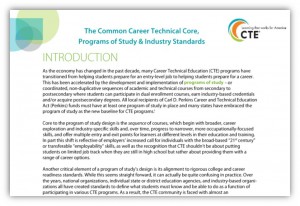 Yesterday, NASDCTEc released a new paper - The Common Career Technical Core, Programs of Study & Industry-Based Standards – during a webinar. Leveraging the methodology used to compare over 45 states’ CTE standards to the Common Career Technical Core (CCTC) last year for The State of Career Technical Education: An Analysis of State CTE Standards, this new paper examines how a set of 18 industry-based standards match up to the CCTC, with deep implications for state and local development of standards-based programs of study.
Yesterday, NASDCTEc released a new paper - The Common Career Technical Core, Programs of Study & Industry-Based Standards – during a webinar. Leveraging the methodology used to compare over 45 states’ CTE standards to the Common Career Technical Core (CCTC) last year for The State of Career Technical Education: An Analysis of State CTE Standards, this new paper examines how a set of 18 industry-based standards match up to the CCTC, with deep implications for state and local development of standards-based programs of study.
Critically, as we state in the paper, “The intent of this analysis is not to judge any industry-based standards…rather the intent is provide actionable information to state and local CTE leaders as think through how they use industry-based standards within the context of a program of study.â€
What Did We Find?
For one, the industry-based standards, on average, were not particularly well aligned with the CCTC. However, this was largely as expected based on scope and design of the CCTC compared to most industry-based standards. The CCTC are benchmark standards that identify what a student should know and be able to do after completing a program of study. As “benchmark standards,” the CCTC are intentionally broad; as “end of program of study standards,” the CCTC cover the full range of knowledge and skills to be imparted over a sequence of courses, from the broadest career exploration to the more occupationally-specific skills. Alternatively, most industry-based standards focus squarely on those occupationally-specific skills, leading to a disconnect between them and the CCTC.
We also found that the majority of industry-based standards did not, on average, address the 12 Career Ready Practices, which are the cross-cutting skills and dispositions necessary for any individual in the workplace. Perhaps the most surprising finding was that less than half of the industry-based standards fully aligned to such Practices as “communicate clearly, effectively and with reason” and “work productively in teams while using cultural/global competence,” which are so highly demanded in today’s economy.
However, the analysis showed that many of the industry-based standards reviewed did align well with the Career Pathway-level standards, which are the most specific standards within the CCTC. Additionally, industry-based standards developed by consortia, such as the National Council for Agriculture Education and the Manufacturing Skill Standards Council, were much  more likely to address both the Career Cluster and Career Pathway-level standards.
What Are the Implications?
The bottom line is that industry-based standards play an important role in preparing students for careers, but that they cannot alone make up a program of study as they often fail to address the broader career exploration skills, as well as those key cross-cutting or “employability” skills that have utility in any career. As state leaders and other stakeholders develop, review and/or approve programs of study, they must:
- Ensure the standards not only address the key occupationally-specific skills, but also those addressed at the Career Cluster level, as well as the Career Ready Practices, and
- Provide guidance to local leaders and educators on how to implement the various sets of state and industry-based standards available and build out a coherent sequence of courses and learning experiences aligned to those different standards.
Read the full report here, watch the webinar recording or download the webinar PPT.
Kate Blosveren, Associate Executive Director, NASDCTEc

